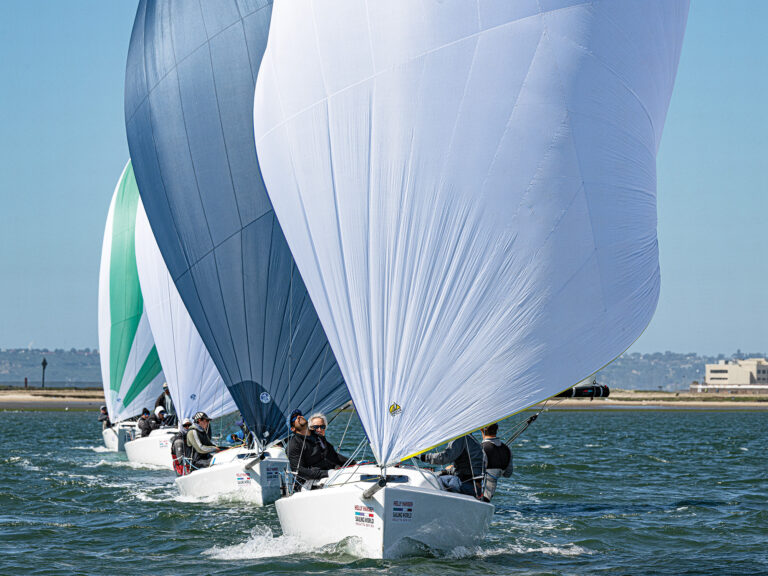I always thought that the worst way to start a race is by being called OCS. But on Sunday, during an otherwise glorious day of Laser frostbiting on Newport Harbor, I discovered a potentially more disastrous opening act: believing that you’ve been called over early when in fact you were clear.
Not only are you well behind the fleet right out of the box, but you must also deal with the frustration and anger that comes from knowing you had a clean start until you mistakenly turned around.
I had produced a passable result in Race 1, despite arriving at the starting line just seconds before the first sequence started. In Race 2, I set up for a mid-line start, kept my bow even with the boats around me (our race committees tend to be somewhat relaxed when it comes to calling boats OCS) and pulled the trigger. The race committee sounded one horn, and bellowed a number or two, thought I couldn’t really hear which ones? “Was that a seven? Maybe, but certainly not two of them,” My sail number is 717. After a short delay, I heard another voice, closer to me, say my number. “Nuts!”
I blew off the vang, and started heading toward the line to restart, when the race committee boat kindly yelled that it wasn’t me, but a similar number.
I trimmed back in and started screaming. I’ve worked long and hard on maintaining a more levelheaded demeanor on the course, no matter what happens. But I have my limits. I was ticked off, to put it mildly.
This, however, is not the lesson of the race.
After trimming back in, and finding myself sailing in the backwash of 15 other Lasers heading toward the port layline, I tacked, found some clean air and a favorable shift on the starboard layline, and was right back in the mix by the windward mark, no small feat given how short our frostbite beats usually are.
This definitely eased my frustration, but I was still determined to not give away any further points that race. In other words, at least for this race, I was going to sail mean.
On the second beat, I made another gain by playing the left side, while everyone looked for that same right shift I’d used so well on the first beat.
As I approached the starboard layline on port tack, probably 10 lengths from the mark, I was among a group of six boats fighting for third through ninth. Unfortunately, I didn’t realize how closely packed we were. Through my window, I could see a starboard tacker approaching on what looked to be a slightly fat layline. I couldn’t cross, and the duck would’ve been significant. So I decided to try to leebow him and take his lane. Every point counts, I thought to myself.
Immediately after the tack, I looked OK. But then a boat tacked on my leebow, and a few others crossed and set up to windward. My lane closed down quickly and making the mark was looking dicey, at best. With a length to go to the mark, I gave up and circled around, only to find a wall of starboard tackers. I tried to force my way into the parade and fouled a boat—another circle. I eventually rounded in the low teens.
Our Laser fleet is known for being competitive. Doing well usually means you have to look at every boat as simply another point on your scoresheet. Fortunately, most people sail with a similar dog-eat-dog approach and hard feelings rarely come ashore. However, in this case, I didn’t see the bigger picture. Before trying to poach that starboard tacker’s lane, I should’ve checked over my shoulder to see what was coming in from the left side of the top portion of the beat. With that many boats converging on the mark, the better move would’ve been to simply duck, set up on a conservative layline and then roll over the chaos that inevitably ensues when a lot of boats come in to the windward mark on or close to the port layline. I let myself get too focused on an individual battle and it really cost me.
How much? Well, I probably would’ve rounded the mark in sixth or seventh, but just a length or three from third. The boat that tacked on my leewbow as I tried to squeeze up to the mark—it was impressive that he made it, but his air was just a little cleaner—finished fourth. Another boat in the scrum took third. The boart I tried to leebow finished sixth. I wound up 12th. The breeze died out after four races, I finished seventh on the day, tied on points for sixth, and just five points out of fourth. Had I merely held my position in that race, I would’ve likely finished fourth for the day.
Every point does count, but sometimes you have double check that the fight for one won’t cost you a few others.









